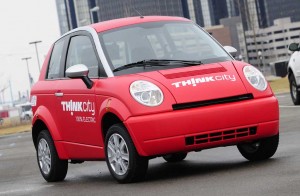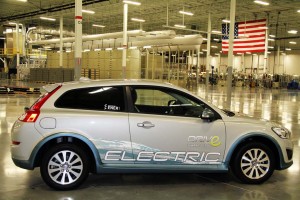
Ener1's finances took a serious turn for the worse when major client Think went broke last year - the Think City battery car shown here.
Ener1 Inc., the ambitious New York-based maker of lithium-ion batteries for electric vehicles and energy storage, has filed for bankruptcy despite receiving $118 million in grants from the U.S. Department of Energy — and lavish-support from the Republican-controlled state of Indiana, home to one of the company’s principal factories.
The “pre-packaged” bankruptcy was filed after the company reached agreement with its primary investors and lenders on a restructuring plan “that will significantly reduce its debt and provide up to $81 million to recapitalize the company,” Ener1 officials said in a statement released after the filing.
Though Ener1 expects to continue operating and still hopes to eventually profit as battery car demand grows its bankruptcy filing could turn into a political football with both Democrats and Republicans pointing fingers.
The company’s statement said Ener1 expected to maintain its current employment level of approximately 700 and eventually repay creditors. It has 275 employees in Indiana.
“The company’s operating subsidiaries do not plan to reduce employment levels as a direct result of the filing, although they will continue to monitor market conditions and make adjustments to the workforce as appropriate,” the Ener1 officials said in a statement.
Market conditions have clearly not turned in the direction that Ener1 had been anticipating when it opened the plant outside Indianapolis that was supposed to serve as the primary battery source for both Volvo’s C30 Electric and the little Think City. The latter maker had itself chosen Indiana as a base of operations for what it thought could become a significant product in the emerging battery car market.
But demand never took off and Think itself went into bankruptcy in June 2011, resulting in a sharp decline in demand for Ener1 batteries.
“This was a difficult, but necessary, decision for our company,” stated Ener1 CEO Alex Sorokin. “We moved aggressively to reduce costs and shift focus when the marketplace did not evolve as quickly as anticipated. Our business plan was impacted when demand for lithium-ion batteries slowed due to lower-than-expected adoption for electric passenger vehicles.”
Sorkin praised investors and lenders and promised Ener1’s subsidiaries will “meet their ongoing obligations to employees, customers and suppliers.”
Nonetheless, his statement clearly revealed the challenges facing green energy manufacturers, especially during the uncertain ramp up of the electric vehicle market. Sales of all battery-based vehicles, from conventional hybrids to pure battery-electric vehicles, such as the Think City, totaled little more than 2% of the U.S. market in 2011, and many, such as the Chevrolet Volt, missed preliminary sales targets.
“That pressure was exacerbated by volatility in the debt and equity markets that further limited our borrowing ability,” noted Sorokin.
Like Solyndra, the solar power equipment manufacturer that went bankrupt after receiving a $535 million government loan, critics are already pointing at Ener1 as another example of how the Obama Administration’s energy program has wasted taxpayer dollars. But this time, there’s bipartisan blame. Ener1 received strong support – including state financial assistance backed by Indiana Gov. Mitch Daniels, who delivered the GOP rebuttal to the President’s State of Union address.
Daniels has personally spearheaded a state effort to make Indiana “battery car central,” attracting a wide range of electric vehicle makers and suppliers – two key players, Think and Ener1 now bankrupt.
Already conservative talk show hosts opposed to alternative energy projects have started to use Ener1 to attack the federal program that provided financing to the company, which had also attracted support from venture capitalists. Many of the critics, such Fox News host Sean Hannity are avid supporters of the oil industry
Ener1 has filed a proposed Disclosure Statement and Plan of Reorganization with the Court and anticipates completing the restructuring process in approximately 45 days, the company.
The restructuring plan provides for the continued normal operation of subsidiary businesses, including EnerDel, EnerFuel, NanoEner, Emerging Power and Ener1 Korea, all of which will honor their customer commitments and will continue to pay their suppliers for goods and services as usual.
The pre-packaged restructuring plan, which has been unanimously accepted by all of Ener1’s impaired creditors, provides for a restructuring of the Company’s long-term debt and the infusion of up to $81 million of equity funding, which will support the continued operation of Ener1’s subsidiaries and help ensure that the restructuring will not adversely impact their employees,
Of this amount, a new debtor-in-possession (DIP) credit facility of up to $20 million will be available upon Court approval to support working capital needs during the restructuring. The balance, for a total of up to $81 million, will be available over the four years following Court approval of the restructuring plan and subject to the satisfaction of certain terms and conditions.
In addition to the restructuring of long-term debt, the claims of Ener1’s general unsecured creditors will be unimpaired and paid under the restructuring plan submitted to the court. However, under the plan, all of the Company’s existing common stock will be canceled, the long-term debt holders will be receiving a combination of cash, a new term loan and new common stock in exchange for their claims, and new preferred stock will be issued to the provider of the post-petition and exit funding pursuant to the restructuring plan when it is approved by the Court.
Paul A. Eisenstein contributed to this report.

